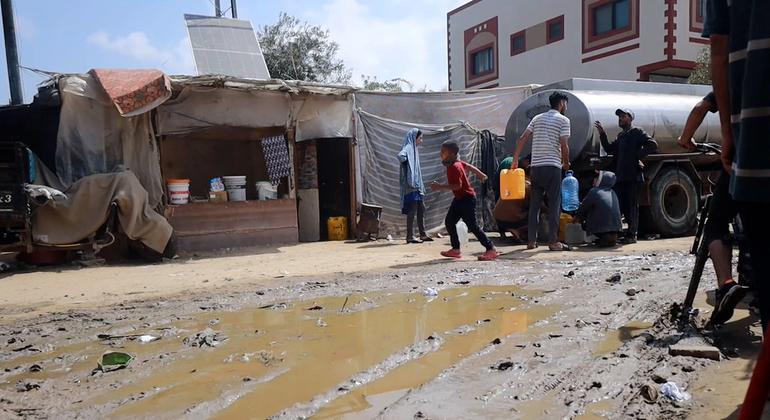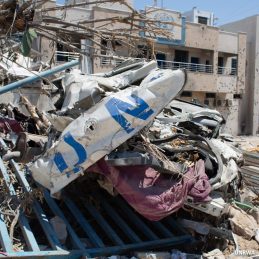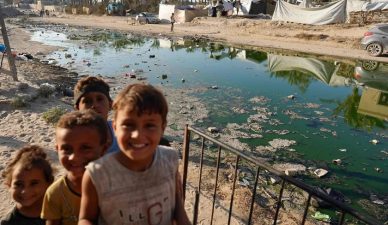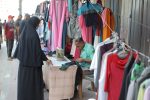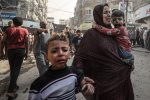GAZA, (PIC)
With the rise of temperature and the advent of the summer season, new aspects of suffering arise in the Gaza Strip coupled with the ongoing Israeli genocide.
The Gaza Strip, which suffers from a suffocating siege and a shortage of the equipment and machinery for waste transport due to the destruction of most of it in Israeli bombardment, is witnessing an accumulation of waste that is not being removed from the temporary collection points, piling up in the streets, alleys, and scattered displacement camps, and not being transported to designated sites.
The repeated Israeli bombardment has also caused sewage overflow in the streets, making the entirety of Gaza a fertile ground for the proliferation of insects and rodents, and the spread of foul odors, which necessarily means the spread of many skin and respiratory diseases.
This suffering is not limited to those living in tents and displacement camps, but extends to those who remained in their homes.
Mosquitoes and rodents
Om Karam, a mother of five, recently displaced from her home in the Yibna refugee camp in Rafah to a displacement camp west of Deir al-Balah in the central Gaza Strip, suffers greatly due to the accumulation of waste around the camp and the intense heat that has made the tent she lives in a furnace, in her own words.
The PIC correspondent visited the camp for the displaced where Om Karam lives, and he personally observed tons of untreated waste, which emits foul odors and is infested with insects and flies, making it unbearable to even pass by.
“Mosquitoes at night and flies during the day, and rats have become part of our life here. We do not sleep at night and cannot sit during the day because of the flies and mosquitoes, and the stench has killed us,” this is how Om Karam described her living conditions in the displacement camp.
She tells our correspondent that the mosquito bites make one of us scratch our skin until blood sometimes comes out due to the severe bites caused by the large mosquitoes that spread with the onset of evening, making the night a piece of torment.
She points to the intense heat inside the tents, which is exacerbated by the scarcity of water needed for cleaning and bathing, in addition to the scarcity of clean drinking water.
The hell of the tent
Malik, a father of three children who lives with them and his wife in a tent they set up in the middle of the Nuseirat refugee camp in the Gaza Strip, says “we live in a hell that people call a tent. Intense heat that is unbearable, even the water inside the tent becomes hot, and when we drink it, it does not quench our thirst.”
With a voice mixed with fatigue and anger, Malik speaks to our correspondent about the insects, especially mosquitoes, stressing that he has never seen in his life mosquitoes of the size he sees these days, and says: “Sleep here has become a dream, and if you sleep out of sheer exhaustion, you wake up to mosquito bites all over your body.”
Malik expresses his fear of his children contracting diseases due to the widespread garbage and insects, and the constant overflow of sewage water in the streets surrounding the displacement camp, calling on the world to stop the crimes of the occupation, have mercy on his children and the children of Gaza.
In mid-April, the mayor of Nuseirat in the Gaza Strip, Iyad Al-Mughari, said that the ongoing Israeli aggression has deprived the residents of the most basic humanitarian services such as water, sanitation, and waste collection, leading to the spread of diseases due to water scarcity, the spread of insects and rodents due to the accumulation of waste in the streets.
He called on the international community and all international organizations to intervene urgently and save what remains of human life in the Gaza Strip, which is guaranteed by international law, and to work to provide the needs of the municipalities, especially diesel in sufficient quantities to operate the water wells, sewage pumps, cleaning equipment and heavy machinery needed to remove the rubble and retrieve the bodies of the martyrs, in addition to providing the necessary spare parts to repair the main water lines and heavy machinery.
A worsening crisis
According to United Nations institutions, insects, rodents and stray animals have transmitted many diseases among the citizens.
According to the World Health Organization, vector-borne diseases account for more than 17% of all infectious diseases globally, and cause the death of more than 700,000 people annually around the world. These diseases can result from parasites, bacteria or viruses.
The World Health Organization spokeswoman, Margaret Harris, previously confirmed the continued rise in rates of infectious diseases in Gaza.
She referred to the registration of 614,000 cases of upper respiratory tract infections and 330,000 cases of diarrhea among the displaced in the shelters since October 7, 2023 until the end of the first week of April, as well as the monitoring of 83,500 cases of scabies, 48,000 skin rashes, 7,300 cases of chickenpox, and 21,300 cases of jaundice.

